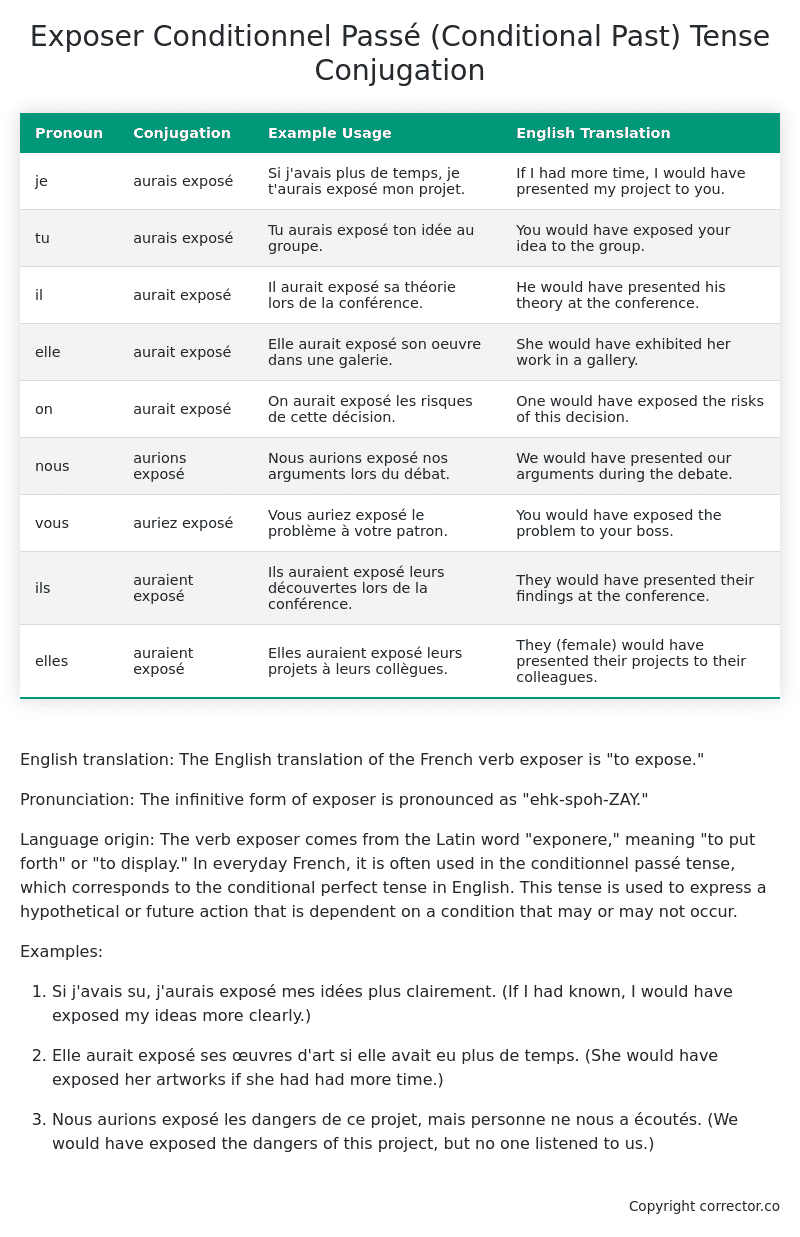Conditionnel Passé (Conditional Past) Tense Conjugation of the French Verb exposer
Introduction to the verb exposer
English translation: The English translation of the French verb exposer is “to expose.”
Pronunciation: The infinitive form of exposer is pronounced as “ehk-spoh-ZAY.”
Language origin: The verb exposer comes from the Latin word “exponere,” meaning “to put forth” or “to display.” In everyday French, it is often used in the conditionnel passé tense, which corresponds to the conditional perfect tense in English. This tense is used to express a hypothetical or future action that is dependent on a condition that may or may not occur.
Examples:
-
Si j’avais su, j’aurais exposé mes idées plus clairement. (If I had known, I would have exposed my ideas more clearly.)
-
Elle aurait exposé ses œuvres d’art si elle avait eu plus de temps. (She would have exposed her artworks if she had had more time.)
-
Nous aurions exposé les dangers de ce projet, mais personne ne nous a écoutés. (We would have exposed the dangers of this project, but no one listened to us.)
Table of the Conditionnel Passé (Conditional Past) Tense Conjugation of exposer
| Pronoun | Conjugation | Example Usage | English Translation |
|---|---|---|---|
| je | aurais exposé | Si j’avais plus de temps, je t’aurais exposé mon projet. | If I had more time, I would have presented my project to you. |
| tu | aurais exposé | Tu aurais exposé ton idée au groupe. | You would have exposed your idea to the group. |
| il | aurait exposé | Il aurait exposé sa théorie lors de la conférence. | He would have presented his theory at the conference. |
| elle | aurait exposé | Elle aurait exposé son oeuvre dans une galerie. | She would have exhibited her work in a gallery. |
| on | aurait exposé | On aurait exposé les risques de cette décision. | One would have exposed the risks of this decision. |
| nous | aurions exposé | Nous aurions exposé nos arguments lors du débat. | We would have presented our arguments during the debate. |
| vous | auriez exposé | Vous auriez exposé le problème à votre patron. | You would have exposed the problem to your boss. |
| ils | auraient exposé | Ils auraient exposé leurs découvertes lors de la conférence. | They would have presented their findings at the conference. |
| elles | auraient exposé | Elles auraient exposé leurs projets à leurs collègues. | They (female) would have presented their projects to their colleagues. |
Other Conjugations for Exposer.
Le Present (Present Tense) Conjugation of the French Verb exposer
Imparfait (Imperfect) Tense Conjugation of the French Verb exposer
Passé Simple (Simple Past) Tense Conjugation of the French Verb exposer
Passé Composé (Present Perfect) Tense Conjugation of the French Verb exposer
Futur Simple (Simple Future) Tense Conjugation of the French Verb exposer
Futur Proche (Near Future) Tense Conjugation of the French Verb exposer
Plus-que-parfait (Pluperfect) Tense Conjugation of the French Verb exposer
Passé Antérieur (Past Anterior) Tense Conjugation of the French Verb exposer
Futur Antérieur (Future Anterior) Tense Conjugation of the French Verb exposer
Subjonctif Présent (Subjunctive Present) Tense Conjugation of the French Verb exposer
Subjonctif Passé (Subjunctive Past) Tense Conjugation of the French Verb exposer
Subjonctif Imparfait (Subjunctive Imperfect) Tense Conjugation of the French Verb exposer
Subjonctif Plus-que-parfait (Subjunctive Pluperfect) Tense Conjugation of the French Verb exposer
Conditionnel Présent (Conditional Present) Tense Conjugation of the French Verb exposer
Conditionnel Passé (Conditional Past) Tense Conjugation of the French Verb exposer (this article)
L’impératif Présent (Imperative Present) Tense Conjugation of the French Verb exposer
L’infinitif Présent (Infinitive Present) Tense Conjugation of the French Verb exposer
Struggling with French verbs or the language in general? Why not use our free French Grammar Checker – no registration required!
Get a FREE Download Study Sheet of this Conjugation 🔥
Simply right click the image below, click “save image” and get your free reference for the exposer Conditionnel Passé tense conjugation!

Exposer – About the French Conditionnel Passé (Conditional Past) Tense
Formation
Common Everyday Usage Patterns
Expressing Unreal Past Scenarios
Polite Requests or Suggestions
Expressing Doubt or Uncertainty
Interactions with Other Tenses
Conditional Present
Indicative Past Tenses
Conditional Future
Summary
Want More?
I hope you enjoyed this article on the verb exposer. Still in a learning mood? Check out another TOTALLY random French verb conjugation!


